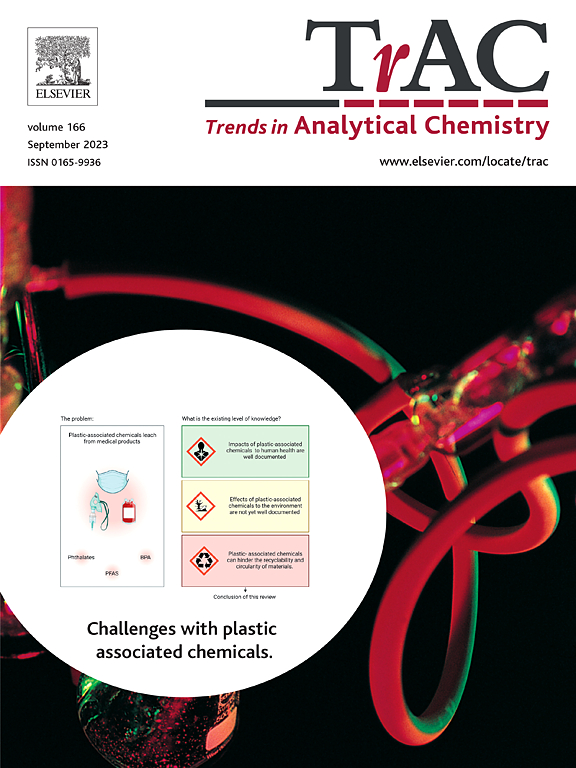人工智能集成微流控技术在分析和生物分析应用中的最新进展综述
IF 12
1区 化学
Q1 CHEMISTRY, ANALYTICAL
引用次数: 0
摘要
在当今的生物医学研究中,人们越来越追求既能获得最高精度和准确度,又能最大限度减少样本量和预处理要求的诊断工具。在这方面,微流控设备通过减少样本量和总体研究成本,提供了前景广阔的解决方案。然而,从这类设备中获取数据的复杂性和耗时性带来了巨大挑战。为了克服这些困难,研究人员越来越多地转向将人工智能(AI)与微流控平台相结合,从而出现了 "AI 集成微流控"。计算机相关领域的最新进展可将人工智能从一门理论科学转变为各种研究的有用工具,预计它将成为人类生活不可或缺的一部分。本综述全面概述了将人工智能算法与微流控平台相结合进行分析和生物分析评估的各种方法。论文重点介绍了从细胞分类和疾病检测到护理点诊断等各种应用,强调了人工智能集成微流控技术在推动生物医学研究和临床诊断方面的变革潜力。本文章由计算机程序翻译,如有差异,请以英文原文为准。

A review on recent advances of AI-integrated microfluidics for analytical and bioanalytical applications
In today's biomedical research, the pursuit of diagnostic tools boasting maximum precision and accuracy while minimizing sample volume and pre-treatment requirements, has intensified. In this regard, microfluidic devices offer promising solutions by reducing sample size and overall research costs. However, the intricate and time-consuming nature of the data obtained from such devices poses significant challenges. To overcome these difficulties, researchers have increasingly turned to the integration of artificial intelligence (AI) with microfluidic platforms, resulting in the emergence of “AI-integrated microfluidics”. Recent advances in computer-related fields can transform AI from a theoretical science to a useful tool for various studies which is anticipated to become an integral part of human life. This review provides a comprehensive overview of various approaches for combining AI algorithms with microfluidic platforms for analytical and bioanalytical assessments. Highlighting applications ranging from cell classification and disease detection to point-of-care diagnostics, the paper underscores the transformative potential of AI-integrated microfluidics in advancing biomedical research and clinical diagnostics.
求助全文
通过发布文献求助,成功后即可免费获取论文全文。
去求助
来源期刊

Trends in Analytical Chemistry
化学-分析化学
CiteScore
20.00
自引率
4.60%
发文量
257
审稿时长
3.4 months
期刊介绍:
TrAC publishes succinct and critical overviews of recent advancements in analytical chemistry, designed to assist analytical chemists and other users of analytical techniques. These reviews offer excellent, up-to-date, and timely coverage of various topics within analytical chemistry. Encompassing areas such as analytical instrumentation, biomedical analysis, biomolecular analysis, biosensors, chemical analysis, chemometrics, clinical chemistry, drug discovery, environmental analysis and monitoring, food analysis, forensic science, laboratory automation, materials science, metabolomics, pesticide-residue analysis, pharmaceutical analysis, proteomics, surface science, and water analysis and monitoring, these critical reviews provide comprehensive insights for practitioners in the field.
 求助内容:
求助内容: 应助结果提醒方式:
应助结果提醒方式:


